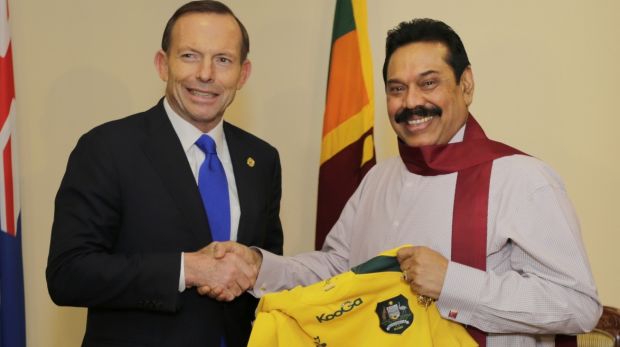According to successive Sri Lankan governments the only war crimes committed during the country’s long civil war, from July 1983 to May 2009, were those perpetrated by the Tamils; aggressive denial has defined their response.
The alienation of the minority Tamil population from the majority Sinhalese began in colonial times, when Britain sought to accentuate rivalries by favouring Tamils in administrative positions. After independence, when the Sinhala language was declared the official language, Tamils had restrictions imposed on their access to education, jobs in the public sector and professional bodies. A state-sanctioned pogrom against Tamils occurred in in 1983, and many Tamils fled Colombo and the south for the north. The notion of a separate state was born as the means of surviving Sinhalese chauvinism. A military force was established to protect these aims.

Tony Abbott with then president Mahinda Rajapaksa during a 2013 visit to Sri Lanka. Photo: Getty Images
Hit-and-run tactics and suicide bombings eventually evolved into a full-scale civil war ending in 2009 with the massacre of 80,000 Tamil civilians and fighters known as the Tamil Tigers.
There were strong and sustained calls from the international community for crimes amounting to genocide to be investigated by an international tribunal, preferably the UN. To counter the aggressive propaganda of Sinhala nationalists, the calls for international action included the inclusion of war crimes committed by the Tamil Tigers. Governments in Australia have gone along with this in order to bolster their illegal policy of turning back asylum seekers arriving by boat. Returning asylum seekers and refugees to a place of danger attracts a strong legal sanction known as sur place, and in this instance makes Australia directly complicit in the crime of genocide.
The previous Rajapaksa government received support and assistance from Australia in prosecuting its policy of genocide against the Tamil population. An Australian Federal Police contingent is posted to the Australian High Commission in Colombo to assist the local police and navy stop boats. There are allegations that the AFP contingent is aware that Tamils returned illegally from Australian custody have been tortured in detention.
Australia supplied patrol boats to the Sri Lankan navy for the express purpose of turning back boats, despite it becoming public knowledge that President Mahinda Rajapaksa’s brother, installed as minister for defence, was involved in the chain of people smuggling. On a visit to Sri Lanka in 2013, Tony Abbott, as Prime Minister, said that under certain circumstances torture could be justified, which was and remains an extraordinary statement.
As Foreign Minister, Bob Carr, referred to Tamil asylum seekers as economic migrants, despite all evidence to the contrary. His successor, Julie Bishop, has done the same. Australian governments have adopted the fiction that the minority Tamils were the aggressors in the civil war. Their position is that Sinhalese won the war, peace has been restored and the Tamils must accept it and get on with life; which consists of a military occupation of the north, confiscation of their land, desecration of their cemeteries, rape of the women and marginalisation from economic activity; all against a background of bribery, cruelty and corruption.
That is not the finding of the Peoples’ Tribunal on Sri Lanka, which met in Bremen in 2013. It found that, “On the strength of the evidence presented, the tribunal reached the consensus ruling that the state of Sri Lanka is guilty of the crime of genocide against Eelam Tamils (Tamils from the north and east) and that the consequences of the genocide continue to the present day with ongoing acts of genocide against Eelam Tamils”.
The tribunal determined that the following acts were committed by the government of Sri Lanka: killing members of the group; causing serious bodily or mental harm to members of the group and acting with the specific intent of destruction of a protected group. It also found that there was continuity of genocide through ongoing acts of genocide and that the state deliberately inflicted on the group conditions of life calculated to bring about its physical destruction in whole or in part.
The new government of President Maithripala Sirisena undertook in 2015 to allow an internationally supervised investigation into the massacre that took place at the end of the civil war. This undertaking followed a UN Human Rights Council resolution on September 24, 2015, calling for such an investigation.
However, responding to growing pressure from within Sri Lanka, Sirisena has pulled back from implementing the decision. Visiting Sri Lanka in March 2016, the UN Human Rights Commissioner, Zeid Ra ‘ad al Hussein, said it was important the investigation took place, so that Sri Lanka could learn from its mistakes.
Australia has not pressed Sri Lanka to comply with the UN resolution, and indeed in August 2016, Immigration Minister Peter Dutton ordered the return of asylum seekers to Sri Lanka who had been trying to reach Australia by boat.
Bruce Haigh is a political commentator and former diplomat who served in Sri Lanka.